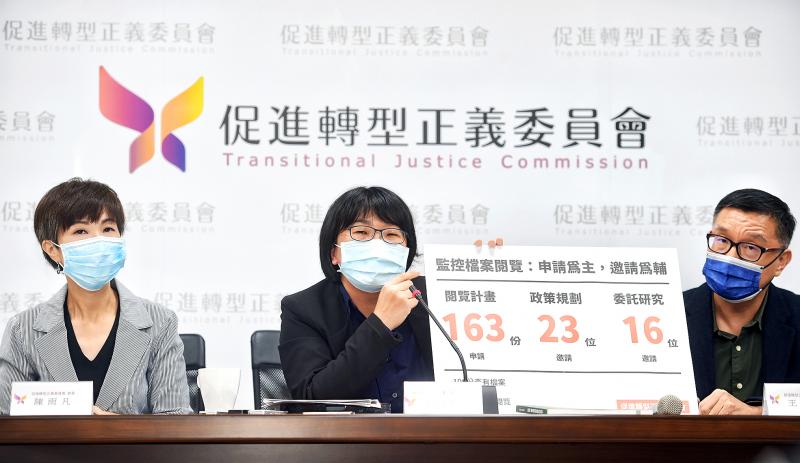The Transitional Justice Commission yesterday said it is recommending legal amendments that would hold perpetrators of White Terror offences accountable for their actions.
The amendments being mulled are to include the revocation of government stipends and commendations, and that a draft would be completed by May next year, the commission told a news conference in Taipei.
The commission is to probe into declassified national security archives to identify perpetrators, especially the then-heads of state apparatuses who can be charged or disciplined for crimes, commission spokeswoman Chen Yu-fan (陳雨凡) said.

Photo: Fang Pin-chao, Taipei Times
This means those accused of committing crimes would face justice in court, while the internal affairs units of the civil service would deal with public servants whose alleged misdeeds did not meet the standards of a crime, she said.
Mechanisms would be put in place to encourage reconciliation by allowing perpetrators to tell the truth in exchange for leniency or immunity, Chen said.
Although many perpetrators would by now be deceased, the responsibility to bring the past into light still exists, she added.
The commission’s acting minister, Yeh Hung-ling (葉虹靈), said the commission’s research is focused on the military tribunal system and the political framework of the party-state system.
The single-party state system enabled the Chinese Nationalist Party (KMT) to politicize the bureaucratic system, Yeh said.
The KMT controlled the administration of the country from the national government down to villages, the judicial branch, the education system and the foreign affairs establishment; the latter gave it the ability to affect people living outside the country’s borders, she said.
However, the commission does not have a clear idea of the operational system of domestic surveillance under the authoritarian regime, she said.
National security agencies remain reluctant to disclose the identities of their informants, and the commission is continuing to negotiate with them, she added.
The amendments being drafted would define the perimeters of responsibility for perpetrators, select and empower the agencies in charge of investigations, and establish systems of remedy and other technical guidelines, Yeh said.
The commission has granted 100 of 163 applicants access to the White Terror-era national security archives, it said, adding that requests are granted in all cases in which relevant files can be located.
Legislative Speaker You Si-kun (游錫堃) and Deng Chu-mei (鄭竹梅) — the daughter of Deng Nan-jung (鄭南榕), who self-immolated in 1989 in defense of “100 percent freedom of expression” — were among those who filed for archival access.
The commission released the information in the wake of a media report last week that Democratic Progressive Party (DPP) Legislator Huang Kuo-shu (黃國書) was an informant for the KMT in his student days.
Huang confirmed the report and said he would leave the party and not seek re-election.

A strong continental cold air mass is to bring pollutants to Taiwan from tomorrow, the Ministry of Environment said today, as it issued an “orange” air quality alert for most of the country. All of Taiwan except for Hualien and Taitung counties is to be under an “orange” air quality alert tomorrow, indicating air quality that is unhealthy for sensitive groups. In China, areas from Shandong to Shanghai have been enveloped in haze since Saturday, the ministry said in a news release. Yesterday, hourly concentrations of PM2.5 in these areas ranged from 65 to 160 micrograms per cubic meter (mg/m³), and pollutants were

Taiwan’s armed forces have established response protocols for a wide range of sudden contingencies, including the “Wan Chun Plan” to protect the head of state, the Ministry of Defense (MND) said today. After US President Donald Trump on Saturday launched a series of airstrikes in Venezuela and kidnapped Venezuelan President Nicolas Maduro, concerns have been raised as to whether China would launch a similar “decapitation strike” on Taiwan. The armed forces regularly coordinate with relevant agencies and practice drills to ensure preparedness for a wide range of scenarios, Vice Minister of National Defense Hsu Szu-chien (徐斯儉) told reporters before a

EVA Airways on Saturday said that it had suspended a pilot and opened an investigation after he allegedly lost his temper and punched the first officer several times as their plane was taxiing before takeoff at Los Angeles International Airport. According to a report published on Thursday by The Reporter, the incident occurred after the flight’s Malaysian first officer tried to warn the Taiwanese pilot, surnamed Wen (文), that he was taxiing faster than the speed limit of 30 knots (55.6kph). After alerting the pilot several times without response, the first officer manually applied the brakes in accordance with standard operating

NOT AN OPENING: Trump’s violation of international law does not affect China’s consideration in attacking Taiwan; Beijing lacks capability, not precedent, an official said Taiwanese officials see the US’ capture of the president of Venezuela as a powerful deterrent to Beijing’s aggression and a timely reminder of the US’ ability to defeat militaries equipped with Chinese-made weapons. The strikes that toppled Venezuelan President Nicolas Maduro signaled to authoritarian leaders, including Chinese President Xi Jinping (習近平), US President Donald Trump’s willingness to use military might for international affairs core to US interests, one senior official in Taipei’s security circle said. That reassured Taiwan, the person said. Taipei has also dismissed the idea that Trump’s apparent violation of international law could embolden Beijing, said the official, who was not